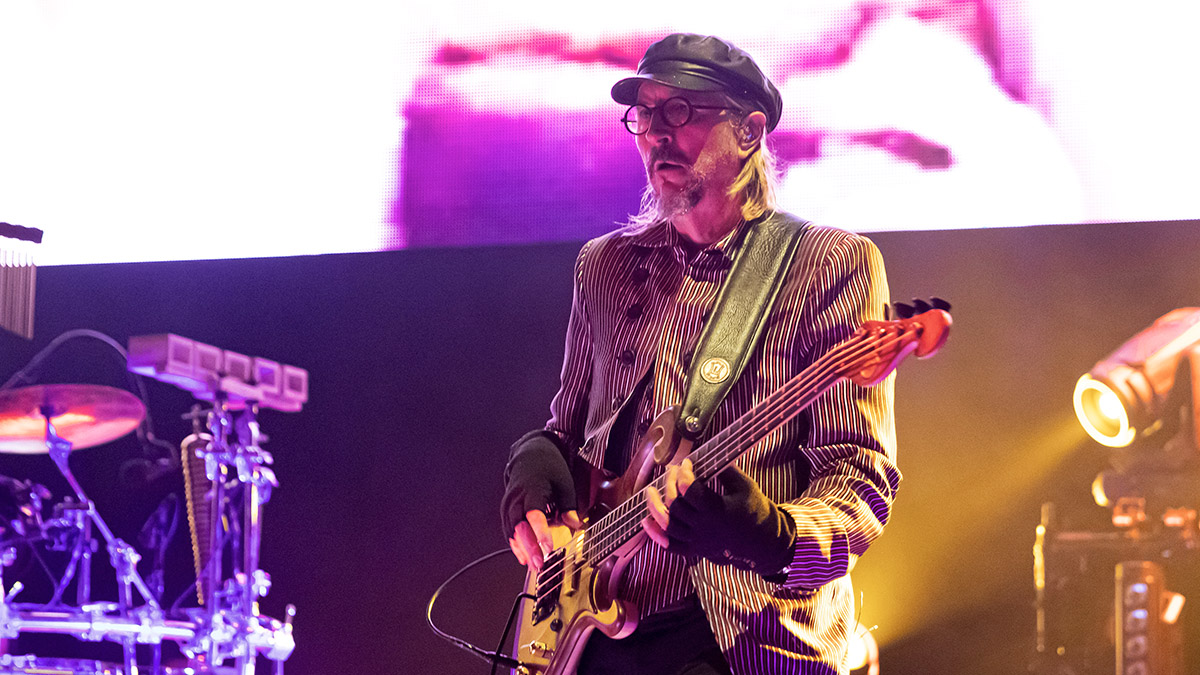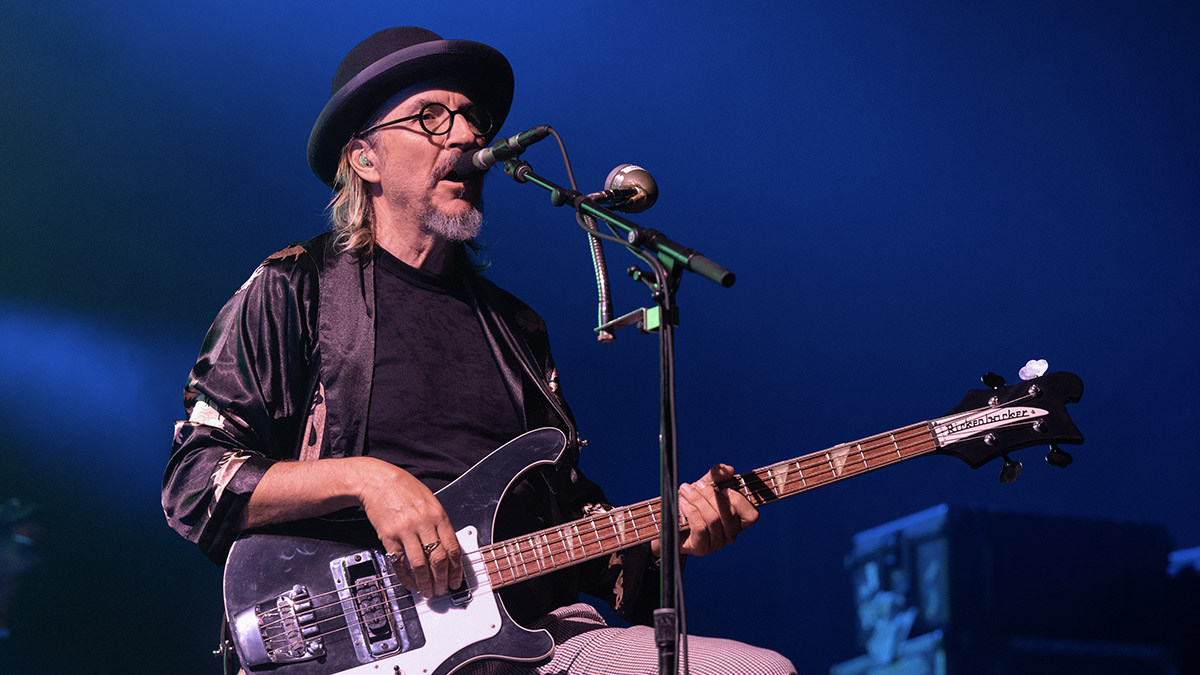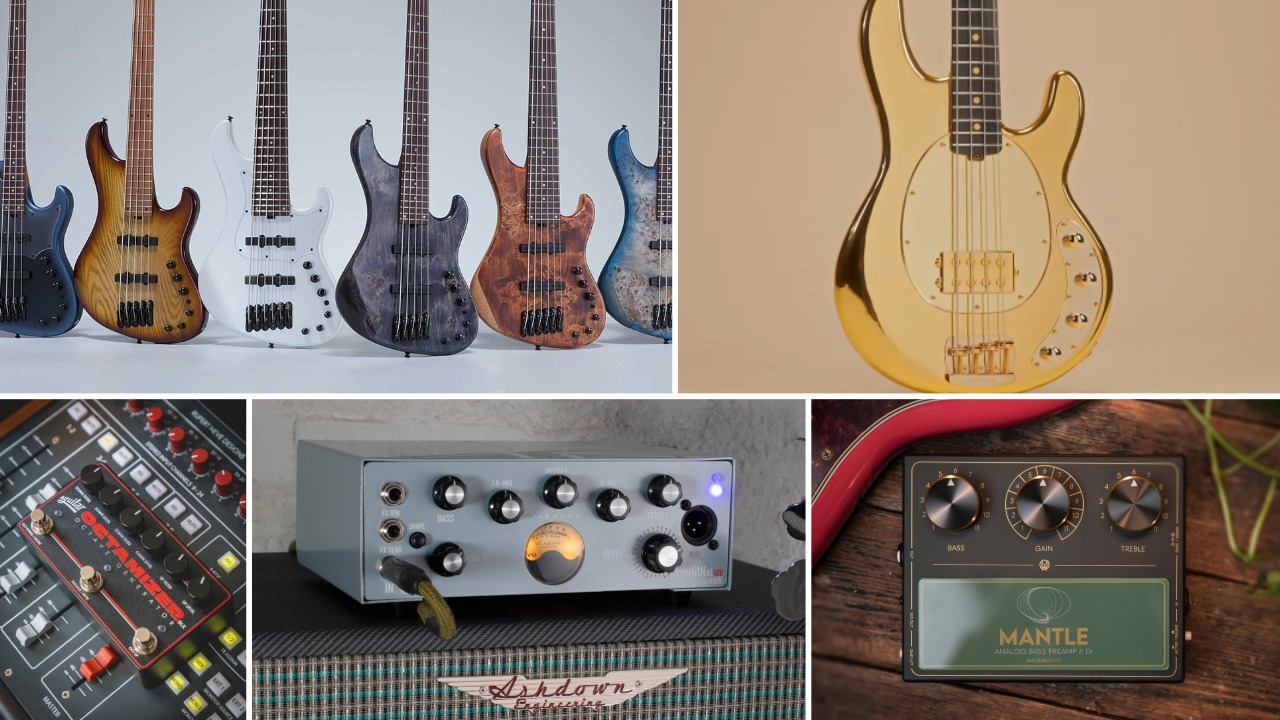Les Claypool: “Singing Geddy Lee parts and playing bass, or just singing Geddy Lee parts period, is f**king hard, because it’s up in the upper stratosphere”
Primus are currently on the road, playing the Rush album A Farewell To Kings in its entirety. We ask Claypool what made him embark on such a mad endeavor

Les Claypool – bassist, producer, novelist and low-end pioneer – is the frontman of the remarkable funk-rock band Primus, as well as a whole string of amazing side projects.
Admired for his thumping and plucking and his willingness to experiment with a host of fretted, fretless, whammy-barred, and multi-stringed instruments, the man can do it all. Tapping, clawhammer-style picking and high-register chords all populate his approach, but technique is as important as feel in his philosophy, with the groove of his playing the mainstay of his music.
You may know the 58-year-old Californian as the voice behind Primus songs such as Jerry Was A Race Car Driver and Tommy The Cat, or for his cameo role in the second Bill And Ted film, or maybe for writing novels, producing movies, running a vineyard and ranting wherever possible about his love of fishing.
Today, though, BP is interviewing the master about Primus’s [then-] forthcoming tour on which they’ll be playing through the whole of A Farewell To Kings by Rush. Who would undertake such a mad endeavor? And what does Geddy Lee of Rush think of it... and how does Les react when we tell him what Geddy thinks of the Claypool approach to bass?
Why did you choose to play A Farewell To Kings as opposed to any other Rush album?
“Well, any Rush album is an undertaking. You know, we always joked that we should go out and play Hemispheres in its entirety – but then we thought, ‘Well, maybe we actually should do Hemispheres in its entirety’.
“But one reason why we didn’t is that you can’t do Cygnus II before you do Cygnus I. In looking at all the Rush records, 2112 seemed a little too obvious, and some of the records have a little more keyboards than I’m comfortable with. But A Farewell To Kings was the first Rush record I ever heard in my youth, and it has Cygnus I on it, which is my all-time favorite tune by those guys.
All the latest guitar news, interviews, lessons, reviews, deals and more, direct to your inbox!
“It was a pretty easy decision to make, you know. A big factor was the damn keyboards. I play keyboards on this thing, and I have a couple of Moogs that are completely covered with different-colored pieces of tape, so I know where to put my fingers. You know, I’m a bass player!”
How do the bass parts compare to the rest of the Rush catalogue?
“They’re spectacular. They’re big. They’re hard! That was back in Geddy’s Rickenbacker days, and I love those Ricky tones, although Moving Pictures was on his Fender Jazz bass, and the tones on that record are equally spectacular. But it’s Geddy Lee, you know – there weren’t a lot of duds in the Geddy Lee bass-playing world.”
So you’re playing a Ricky on this on this tour?
“I’m playing a couple of Rickys, a black 4003 that Rickenbacker sent me, and then I have the double neck, which they hadn’t made in 30 years, but they made one for me. It’s pretty spectacular. The funny thing is that when I was a kid and I had no money, my dream bass was a black Rickenbacker like Geddy’s. I didn’t have one all these years, and now I finally have one, so doing this album has fulfilled one of my dreams of my youth.”
What about the backline? Did you guys go fully authentic with the '70s Rush setup?
“We’re keeping it as authentic as possible. The funny thing is, I avoided the vintage Ampeg SVT heads for my entire career. Not because I didn’t like the sound of them, but because they’re too fucking heavy, and I just never wanted to commit to hauling the damn things around.
“But I would find that I’d go on tour to South America or whatever, and the rentals were always these vintage SVTs and they always sounded amazing, so a handful of years ago, I bought a few of them and I started using them regularly on stage. So coincidentally, I happened to be playing through an old SVT, which Geddy played through back then.”
Any pedals going on?
“Oh, there’s all kinds of shit going on, and buttons to push.”
Do you think the bass parts represent a particular section of Geddy’s career as a bass player? For example, was he in a particularly flamboyant mode when he recorded them?
“Was he ever not in a flamboyant mode? It wasn’t until the '80s, when he focused more on the keyboards, that the bass parts became a little less, I wouldn’t say less prominent, but they weren’t as in your face, I should say.
“Obviously, when he got to Moving Pictures, and even Hemispheres to an extent, he was being pretty flamboyant with YYZ and La Villa Strangiato and things like that. I think there’s a little more riffage in those records. These parts are alligators that you have to wrestle every night, you know?”

How do you find singing and playing bass at the same time?
“Well, there’s a big difference between doing my voice and playing bass, and doing Geddy’s voice and playing bass. For many years, I was never very comfortable with my singing voice, so I always said I was the narrator of the band. But singing Geddy Lee parts and playing bass, or just singing Geddy Lee parts period, is fucking hard, because it’s up in the upper stratosphere.
“I talked to him about it when we were working on this. I said, ‘When you sang those parts, are they falsetto or are they full voice?’ He told me they were full voice, so that was tough. In fact, at one point my son was listening in on some of the rehearsals, and he said, ‘Dad, you need to quit trying to sing it like Geddy. Just sing it in your style. You’re trying to sound like Geddy and it’s a little cringeworthy’.”
I can see definite parallels in approach between Primus and Rush.
“It’s definitely turned around. When we toured with Rush in Europe in the UK, many years ago, we got so much shit for it, especially from the press. They were like, ‘What are you guys doing playing with these prog-rock dinosaurs?
“You know, that was when we were the cool alternative band or whatever back in the day, coming up with Soundgarden and all these other bands. We really got shit on by the press, especially in the UK, for doing that tour. It was like admitting you’re a Star Trek fan or something. In hindsight it was a wonderful, wonderful thing, but the press did not like it so much.”
Admitting you liked Rush in the '90s was like saying ‘I play Dungeons & Dragons’
Ah well. Screw the press.
“And you’re from the press, haha! But that’s exactly what I’m saying. It’s interesting how things have turned around. I was watching a documentary from years ago that I was in, and a lot of musicians stepped up and said, ‘Oh, I’ve been a Rush fan forever’.
“Well, in the early '90s, nobody would have admitted that. They would never admit they were Rush fans. It was like saying, ‘I play Dungeons & Dragons’ – not necessarily the hippest thing to admit in the days of grunge.”
What are the most challenging bass parts on the album?
“Parts of Cygnus are pretty tough, but it’s all relatively tough! Even wrestling the Rickenbacker is a whole different ballgame than playing one of my Pachyderm or Carl Thompson basses. But playing the album has gotten to be very therapeutic. You know, we go out and we do a Primus set, and I’m just like, ‘Okay, let’s get through the Primus set, because I want to play the Rush set’.
“It’s fun. It’s like a vacation. Not that playing Primus songs isn’t fun, but with the Rush thing, I look forward to it every single night. It’s just feels good to play it. So I don’t know which is more challenging, although ironically, Madrigal is probably the most challenging because it’s the most non-Rush song on the album. I don’t think those guys ever played it.”
Are you adjusting your playing with the Ricky?
“It’s heavier for one thing, especially that double neck. That’s like putting cinder blocks around your neck. The Carl Thompsons and my Pachyderm basses are like Ferraris. They’re designed so you can get around them real easy.
“Not that the Ricky isn’t, but Rickys aren’t the best for thumping and plucking, not that I do any of that on the Rush stuff. It’s just a different beast. They sound amazing, but it’s a longer scale, so it’s a little more challenging than one of my Ferraris.”
What was Geddy’s reaction when you told him you wanted to play a Rush album live?
“I actually asked him about it quite a while ago. We originally planned on doing this thing a while ago, but then we ended up taking the Slayer tour which postponed it, and then Covid hit and postponed everything.
“When we originally talked about doing it, Neil Peart was still on the planet. I just texted Geddy and said, ‘Hey, we’re thinking about doing this. What do you think?’ He said, ‘Oh, that would be great’. He was stoked on the idea.
“And Alex [Lifeson, Rush guitarist] has been very supportive too. Lor [Larry LaLonde, Primus guitarist] will call him and say, ‘What the hell chord are you playing in this one section?’ Alex has been very helpful with that, and he loaned him some guitars as well. So they’ve both been extremely supportive. We’ve yet to play it in front of them, and I’m all nervous about that.”
I just texted Geddy and said, ‘Hey, we’re thinking about doing this. What do you think?’ He said, ‘Oh, that would be great’. He was stoked
Is that going to happen?
“I imagine they’ll show up at some show. We’re going to Canada in April.”
Yes – starting off in Toronto.
“We start in Toronto? Holy shit. I didn’t even know that.”
What are Geddy’s strengths as a bassist?
“His phrasing is unbelievable. It’s different than anybody else. It’s almost like Paul McCartney, in that he is very melodic and in the way he phrases it. It’s almost lyrical, the way he phrases his parts, and Geddy has that kind of phrasing.
“You can sing Geddy Lee bass parts. Remember when he did the Big Beautiful Book Of Bass? Well, I was in that thing, because he wanted to put one of my Italian Eko basses in there.
"When he came out to my place, I said, ‘Part of the deal of me doing this is that you’ve got to show me the proper way to play YYZ,’ so we hung out and we played some stuff together, and he showed me how to play that song. It turns out I’ve been playing it wrong this whole time. The fingering is just different than I would think of doing it.
He’s Geddy Lee, you know. Nobody plays like him
“You know, he has his way of doing it, and it looks so effortless. You watch his fingers. When I play that song, I’m doing all this moving around with my fingers, all over the place, but he’s just barely doing anything, and he’s making all these incredible sounds. So he’s Geddy Lee, you know. Nobody plays like him.”
How are you and he similar as bass players, then?
“Well, I grew up listening to that guy. It’s me taking my influences from him. He made some comments in the press recently that I inspired him when we first toured together, but you know, I don’t see it. What I’ve always aspired to do is to have that kind of lyrical phrasing in what I play, especially when I’m doing pizzicato stuff. I often think of guys like Geddy or Paul McCartney or Chris Squire as guys that have that lyrical sense.”
Would those be your three main influences on bass?
“Well, Larry Graham is the king, but there’s a lot of them. I started off with Geddy when I was a kid, and then this one kid who was older than me said, ‘You’ve got to listen to Larry Graham and Stanley Clarke’ and I went, ‘Whoa, there’s a whole other world out there’. Eventually I got to people like Tony Levin, who is one of my all-time favorites. Every note he plays is the right note, and he has one of the best tones of anybody.”
If Geddy showed up to a show, would you let him sit in and do a solo?
“Haha! I have a band with Sean Lennon called The Delirium and we played in Toronto. Geddy told me he was going to come to the show, and I said, ‘Hey, you want to sit in?’ but he was like, ‘You know, I’m not really a sitting-in kind of guy, I’m not a jammer’. I said, ‘It’s Tomorrow Never Knows, it’s one note. If you want to do it, come on!’ And he came out and he killed it. It was amazing. It was one of the highlights of my life.”
We asked Geddy for his analysis of you as a bass player, and he told us, ‘Les has a unique rhythmic sensibility. His tone is original, deep, and true. And he’s developed a style that is deliciously eccentric’. Is that a reasonable assessment, as you see it?
“Wow. That makes me blush. I think that’s wonderful.”
Every now and again I think, ‘Geddy Lee’s a good friend of mine’. If I’d known that when I was 14, I would have ejaculated in my pants
We also asked Geddy what he thought of you doing this tour, and he said that it was a great compliment, and also a little bit nuts.
“Well, I think it is – on all fronts. It’s definitely nuts, and I get to wear a satin robe every night on stage, which is pretty spectacular. That’s another sprinkle on the cupcake of this project.
“Every now and again I think, ‘Geddy Lee’s a good friend of mine’. If I’d known that when I was 14, I would have ejaculated in my pants to even think of the notion. With my career, I’m most proud that I’ve been able to meet, befriend and oftentimes work with a lot of my heroes – and it’s been a wonderful, wonderful thing.”
- The A Tribute To Kings US tour runs until June 19.
